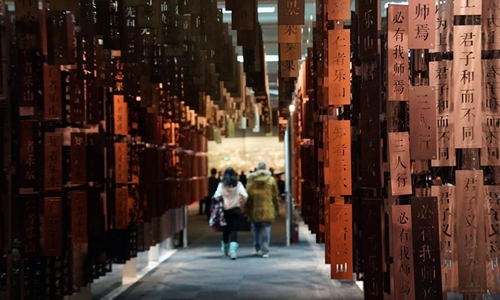Targeting education, culture a sign New Delhi is ramping up disputes with China: observer
Move dangerous, hurts cornerstone of China-Indian ties: observers

People visit the Confucius exhibition at the National Museum of China in Beijing, capital of China, Dec. 27, 2019. A Confucius culture exhibition was held here on Friday showcasing the formation, development and inheritance of Confucianism. (Xinhua/Jin Liangkuai)
Targeting Confucius Institutes and removing Chinese from the list of examples of foreign languages are among a slew of recent moves by the Indian government signaling that New Delhi is planning to upgrade the gradually subduing border conflict with Beijing to the education and cultural exchange level, a move experts called so dangerous that it could hurt the cornerstone of China-India relations.
India's education ministry has decided to review in the coming week the setting up of Confucius Institutes in association with seven local colleges and universities, and it also plans to review 54 Memoranda of Understanding (MoUs) signed between prestigious educational institutions, including the Indian Institute of Technology and Banaras Hindu University and Chinese institutions, the Hindustan Times reported on Sunday.
At the same time, India's National Education Policy (NEP) has not mentioned Putonghua on the list of examples of foreign languages that schools can offer to students, media reported on Sunday. And according to the Times of India, "Chinese out of NEP, reason is obvious."
The 2019 draft policy of the NEP said, "A choice of foreign languages such as French, German, Spanish, Chinese, Japanese would be offered and available to interested students to choose."
As the border conflict is yet to subdue, the Indian government now wants to extend the lingering skirmish between the two countries to the education and cultural level, which is very dangerous, Zhao Gancheng, director of the Center for Asia-Pacific Studies at the Shanghai Institute for International Studies, told the Global Times.
Zhao said that cultural exchanges form the cornerstone of the bilateral relationship between Beijing and New Delhi, and if the base is sabotaged, relations are likely to deteriorate seriously.
Nikhil, an Indian student who studies at Peking University, told the Global Times that learning Chinese is very popular in his hometown Bangalore, and mastering this language is not only out of personal interest, but also helps to find a job, as Bangalore serves as a tech hub and has lots of links with China.
Although the Indian student said the removal of Chinese from the list of examples of foreign languages does not mean the language suddenly becomes inaccessible for Indian students, he believed that the move is a very hostile gesture from the Indian government.
"As far as I see, it is unnecessary to upgrade political or military conflicts to such a level," Nikhil said.
The Indian side attributed the moves to security agencies' alert to growing Chinese influence in higher education in India.
In early July, China's Confucius Institute Headquarters announced that a center for Chinese language exchange and cooperation has been launched under the Ministry of Education and the brand of Confucius Institutes will be fully operated by a newly established non-governmental foundation. Analysts said the move will better facilitate Chinese language teaching overseas and disperse misinterpretations by some Western countries that the organization served as China's ideological marketing machine.
The organization could not be reached by the Global Times as of press time.
Zhao noted that India is now following on the heels of US containment steps against China, which started from skirmishes and then expanded to the people-to-people exchange level, an exchange he warned was already in jeopardy because of the Modi government's hyping of antagonism against China.
Following a deadly clash in the Galwan Valley in June provoked by Indian soldiers' illegal crossing the Line of Actual Control on China-India border, the two sides have conducted several rounds of talks to ease the border tension. Border troops from both countries have completed disengagement in most localities, the Chinese Foreign Ministry said last week.
In a latest development, senior military commanders of India and China held a fresh round of talks on Sunday to ensure expeditious disengagement of troops from all the friction points along the Line of Actual Control, India media reported.
The new move targeting education, cultural and people-to-people exchanges sends a confusing signal, putting India's intention to ease tensions with China in doubt, analysts said.
As India's development has been undercut by the ravaging COVID-19 pandemic, Modi is in dire need of political support from nationalism, but he should be cautious not to add too much fuel to the fire of the existing conflict, said Zhao, noting that peaceful development is what India needs most.
Newspaper headline: India to extend conflict to cultural field